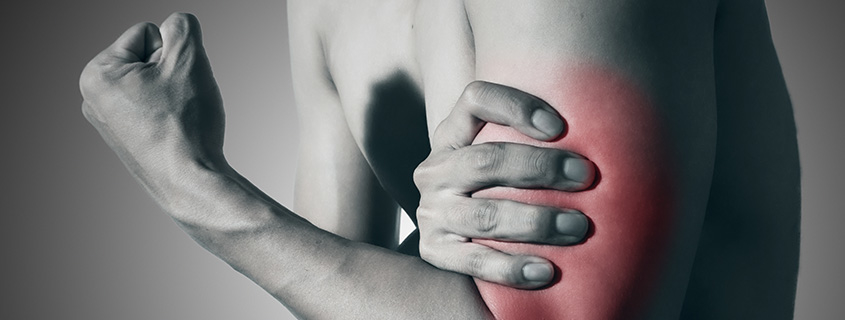Distal Biceps Tendon Problems
Description
The biceps muscle is in the front of your arm (see Figure 1). It bends your elbow and twists your forearm to turn your palm upward. The biceps tendon connects the biceps muscle to your radius bone, which is one of the forearm bones. Such maneuverability may lead to distal biceps tendon problems.
Causes
Over time, the biceps tendon can weaken. This is called tendonosis. Tendonosis of the biceps tendon can be painless or it can cause dull or sharp pain in the area of the tendon just past the elbow in the forearm. Tendonosis can lead to tendon tears or tendon rupture. Not all pain in the area of the elbow is caused by biceps tendon problems. There can be other causes for pain in this area.
Biceps tendon tear or rupture can also cause weakness. This can happen without any warning. It often occurs when lifting heavy objects such as furniture. Weightlifters are more likely to experience this injury when doing “negatives,” which is done while holding a weight and extending the arm at the elbow.
Signs & Symptoms
A biceps tendon rupture usually occurs when the tendon tears away from the forearm bones (See Figure 2). This may be felt as a “pop” in the front of the elbow and can be painful. Often, but not always, people feel continued pain, swelling, bruising and warmth in the elbow. Sometimes, people feel a relief from pain that was present before. Muscle spasms in the biceps muscle are common when this happens. Symptoms usually get better over a few weeks. Also, sometimes the muscle can pull up in the arm toward the shoulder. This results in a muscle with a larger-than-normal appearance.
The elbow will usually continue to work after a biceps tendon rupture. This is because there are other muscles that can do part of the job of the biceps muscle. You may experience weakness when flexing the elbow. Most of the weakness after a biceps tendon rupture occurs when twisting your forearm to turn the palm upward, or in supination. You may experience fatigue with repetitive motions if your tendon is not repaired.
There are many medical problems that can make people more likely to have tendon ruptures. Chronic steroid use, whether for medical purposes or when used to gain muscle, is one of the most common reasons for this to happen.
Tendon rupture is most common in men over age 30, but can happen in women too.
Treatment
If the biceps tendon tears completely, it will not grow back to the bone. You must seek care immediately if this occurs since surgery is an option and surgery is best done soon after the injury. If too much time passes, the tendon may not be repairable.
Your surgeon may choose to use imaging, such as an MRI or ultrasound. This can help to diagnose your tear or to plan for surgery. X-rays are often used at the initial visit. X-rays do not show the tendon well, but can be helpful in looking for other causes of elbow pain.
Surgery is not absolutely required for a biceps tendon rupture, but your doctor may suggest it. If your arm is working well after the rupture, you may choose not to have surgery. If you choose to avoid surgery then you should expect permanent weakness and an arm that becomes more easily fatigued.
Surgery is done to reattach the tendon to the bone or to a nearby muscle. There are many different ways surgeons can reattach tendons to bone. Figure 3 shows a repair of the biceps tendon. After surgery, you will require rehabilitation and time to heal. Often, people are able to resume even heavy activities after surgery and rehabilitation.
Figure 2A – Illustration of an acute rupture of the biceps tendon
Figure 2B – Image of an acute rupture of the biceps tendon
Figure 3A – Repair of the biceps tendon
Orthopedic Sports Medicine Center of Oregon is located in Downtown Portland Oregon. Dr. Dominic Patillo, one of our Board-Certified Orthopedic Surgeons, specializes in hand surgery. His practice focuses on the treatment of both simple and complex hand and upper extremity conditions as well as general orthopaedic trauma. He is experienced with modern microsurgical techniques including nerve and vessel reconstruction.
Common problems treated include:
- carpal tunnel syndrome
- tennis elbow
- wrist pain
- sports injuries of the hand and wrist
- fractures of the hand, wrist, and forearm
- trigger finger
Other problems treated can include arthritis, nerve and tendon injuries, and congenital limb differences (birth defects).
If you have pain in your fingers, hand, wrist or arm, or if you have other upper-extremity related concerns, please consult our hand specialist Dr. Dominic Patillo for a consultation.








